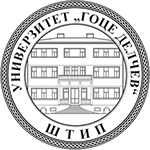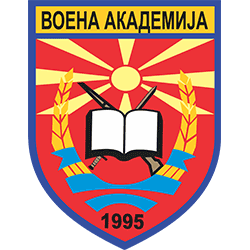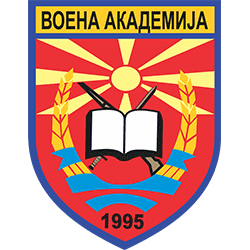
STRATEGY FOR INTERNATIONALIZATION OF THE MILITARY ACADEMY "GENERAL MIHAILO APOSTOLSKI" – SKOPJE
2024 – 2027
- Introduction
Internationalization of the Military Academy "General Mihailo Apostolski"-Skopje is based on tradition and is a leading ambition, but above all it is a need of the Military Academy. Internationalization in higher education is more than the mobility of students and professors, it represents the involvement of universities in the dynamic world we live in, in the rapid development of knowledge, creativity and innovation. It is of crucial importance for quality in teaching and science.
The Internationalization Strategy aims to build on past achievements by further developing the strengths of the Military Academy and establishing new directions for future development initiatives in the international environment. It builds on one of the principles from the Strategy for the Development of the Military Academy, that is: "Encouraging intensive international cooperation in the field of teaching and research work as a prerequisite for the inclusion of the Military Academy in the European research and education processes."
The Military Academy strives for continuous improvement of research and teaching, deepens the international presence, and strengthens the effectiveness of measures that support research and teaching in such international dimensions. The ability to attract foreign students according to criteria and conditions is a serious and acceptable quality indicator of the Military Academy.
These internationalization efforts concern the entire Military Academy, although their actual implementation will respect the approaches and work experiences of the various units and the requirements of the European programs. That is why all activities of the Military Academy, especially in education and research, include internationalization in their activities and goals.
Long-term goals
• Involvement of the Military Academy "General Mihailo Apostolski"-Skopje in the modern flows of inter-university cooperation in Europe, the region and the world;
• Development of international study programs, on the first cycle, as well as on the second cycle, which will be based on the acquired research knowledge;
• Creating students who are ready to act in other environments and different cultures;
• Improving the quality of the teaching and scientific activity of the Military Academy;
• Increasing mobility of students, teaching-scientific and administrative-technical staff;
• Increasing the mobility of incoming students, teaching-scientific and administrative-technical staff;
• Leadership in selected research areas, cooperation with society, regional development, and cross-border cooperation.
• Active role in university and institutional networks;
• Creation of an inter-cultural corner/program within the Erasmus office and the department for international cooperation;
- Research
Research and knowledge exchange support the vision and mission of the Military Academy. The Military Academy actively supports international research collaborations through which researchers reflect their own aspirations to improve international scientific standards and attract more attention to the respective disciplines. The Military Academy "General Mihailo Apostolski"-Skopje has a significant benefit from these collaborations, therefore the Military Academy supports partnership with the most important institutions in the world, from every field of research, which through scientific cooperation and knowledge circulation will improve performance, achievements and efficiency in the area.
Historically, the Military Academy's research collaborations are the strongest with institutions in Europe, collaborations that will no doubt continue in the future.
Through this strategy, the Military Academy supports nascent collaborations and defines new potential collaborations with leading institutions in the Western Balkans, Austria, Bulgaria, Poland, Norway, and other countries of interest.
To achieve this, the Military Academy:
• It will support collaborations with the world's best research organizations that share our commitment to high quality research;
• It will improve the quality of research through cooperation with international institutions in order to increase the scientific impact;
• Will take an active part in international associations and forums that work together in creating solutions to current world challenges.
For the realization of these priorities, the Military Academy will be an active subject in the European area of higher education, offering its researchers and research groups and inviting researchers from partner institutions for cooperation in several fields and within various initiatives. Also, the Military Academy plans to participate in several international projects in various programs and cross-border collaborations and establish research links with international universities in the EU and around the world.
Internationalization of research will be confirmed through publications, patents and innovations, participation in audits and analyzes and participation in several projects.
Through the organization of international conferences, congresses, and professional consultations, we will increase our influence on a regional and international level.
International exchange in the direction of increasing research will be promoted with short-term and long-term mobilities. Financing will be provided by European programs and international funds.
- Teaching
Following the vision of internationalization, the Military Academy "General Mihailo Apostolski"-Skopje will commit to the development of internationally competitive study programs in English for undergraduate and postgraduate studies. With this, the Military Academy tries to prepare all students for the demands of the global and professional world.
The programs will be taught by professors from the Military Academy and international guest lecturers from partner universities in selected priority areas. The focus will be regional and on the countries of the Western Balkans, Turkey, Central, Eastern and Northern Europe, while at the same time the Military Academy will try to expand its activity in Africa, the Middle East and Asia. That is why the Military Academy will strive to provide the best possible conditions for study and administrative support to foreign students.
The main priority of the Military Academy "General Mihailo Apostolski"-Skopje will be encouraging the mobility of the academic staff and students. Outgoing and incoming mobility will be increased through promotional activities by the Erasmus office and provision of additional funding from international, European, and national funds.
In addition to semester-long student exchanges, in the future the work of the Erasmus office will also be aimed at enabling additional short-term exchanges for students, such as summer schools, youth exchanges, training courses and contact seminars.
To achieve this, the Military Academy:
• It will enable all students to have a significant international experience during their studies;
• It will expand the opportunities for studying the English language;
• It will increase the number of faculty integrated undergraduate and postgraduate study programs with Universities from the region and the world;
• Will create new e-tools and digital programs to increase incoming mobility and visibility of the Military Academy.
- Partnerships
The partnerships of the Military Academy are based on bilateral agreements, inter-institutional Erasmus + agreements, as well as partnerships with local and national level institutions and economic subjects of interest. These relationships are fundamental to the work of the Military Academy. They form the basis for institutional and business partnerships and support growth through long-term relationships.
Partnerships with leading institutions and businesses enhance the visibility of the Military Academy and expand ties with countries where we wish to engage and are an essential component of our educational or research presence.
To improve this, the Military Academy:
• Will nurture collaborations with industry partners that help transform our ideas and practices into new technologies and innovations with global impact and application;
• Will focus on and contribute to deepening relations with existing ones institutional and business partners in the region and Europe;
• It will increase interdisciplinary cooperation with partners globally level;
Existing partnerships will be expanded to new fields and new partnerships from specific areas will be established.
A strategic partnership model currently in operation with the Higher Maritime School in Varna; The Military Academy in Oslo, Norway, the Military Academy in Wroclaw, Poland, the Military Academy in Lisbon, Portugal, the Military Academy in Vienna, Austria and several others have proven to be a particularly dynamic driver for the development and internationalization of the University.
In the near future, the network of strategic partnerships should expand and include more partners.
- Implementation and challenges
For the implementation of the internationalization strategy, the best practices of the partner institutions of the Military Academy "General Mihailo Apostolski"-Skopje will be applied, in accordance with the institutional goals and the Development Strategy of the Military Academy from 2024-2027. The strategy must be embedded in all aspects of teaching and learning across the institution so that the Military Academy can adapt to the new challenges that will arise.
Implementation will be centrally coordinated.
Technical-administrative staff should also be further trained to improve their international skills.
To achieve this, the Military Academy:
• It will raise awareness of the internationalization and interculturality of the Military Academy at all levels and create a climate of openness;
• It will use the existing international and intercultural experiences and skills of employees of the Military Academy;
• The motivation of the professors of the Military Academy for teaching English will increase;
• A concept will be developed for financing renowned visiting professors.
The internationalization strategy will be regularly monitored and evaluated to assess whether the approach is achieving its objectives and delivering the expected benefits.
Statistical indicators and surveys will be developed to support effective monitoring of internationalization.
The goals of internationalization will be incorporated into the overall strategy of the Military Academy and the wider processes for ensuring quality in teaching and increasing student satisfaction.


